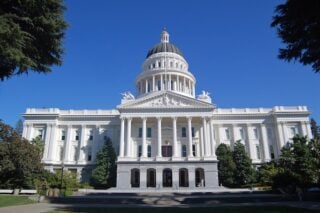
For decades, California law has denied families of mesothelioma patients the right to receive pain and suffering damages on behalf of their deceased loved ones. Families often need these damages to cover the costs of expensive mesothelioma treatments.
A newly signed law, set to take effect on January 1, 2022, changes this situation. Senate Bill 447 (SB 447) will no longer deny families this essential form of mesothelioma compensation. Instead, they will be able to collect this type of damages when their loved one passes away before a verdict.
Previous California Law Rewarded Companies’ Bad Behavior
The previous law was the result of insurance companies’ lobbying. California was one of only five states that denied families pain and suffering damages. The new law changes this.
The previous law created a loophole for defendants in California lawsuits. It advantaged those willing to drag out lawsuits until a plaintiff died in order to decrease potential damages. Defendants could stall the proceedings with tactics such as filing numerous motions or making constant objections at trial.
As such, the loophole allowed defendants to waste the courts’ time and resources. And it rewarded defendants for taxing the time, money and energy of sick or elderly plaintiffs.
The disadvantage to the plaintiff was particularly pronounced in mesothelioma lawsuits. In general, mesothelioma plaintiffs have high medical costs and a less favorable prognosis than many patients with other types of cancers. This means a defendant’s stalling was more likely to succeed and to cause financial hardship than in other types of cases.
In mesothelioma lawsuits, pain and suffering damages may constitute the lion’s share of a judgment against an asbestos company. If the plaintiff died, a losing defendant decreased the amount of potential mesothelioma damages by millions.
SB 447 Will Start Helping Plaintiffs’ Families in 2022
SB 447 removes the incentive for defendants in California to drag out litigation.
To benefit from the new law, the plaintiff must either:
- be alive on January 1, 2022, when the law takes effect; or
- have been granted a preferential trial date before 2022.
Opponents of the bill made several arguments against it. They noted families can file a different claim called a wrongful death action to recover for their own pain and suffering. But wrongful death actions alone, without SB 447, still incentivize defendants to stall during lawsuits to minimize damages.
The bill’s detractors also cited preferential trial dates as a way to accelerate litigation for sick people. If granted, a preferential trial date requires a trial to begin within 120 days. This option works well until it doesn’t. Take, for example, COVID-19’s effect on the California court system. Delays and backlogs during the pandemic caused courts to postpone preferential trials beyond 120 days.
California lawmakers were not persuaded by the bill’s opponents. Although it should be noted that SB 447 has a sunset provision. As a compromise with insurance companies, the law is only effective through the end of 2025. The governor signed the bill into law in October.
Increased Awareness of Mesothelioma Helps Pass Laws Like SB 447
Diseases such as mesothelioma highlight the issues with laws denying families pain and suffering damages on behalf of a deceased loved one. Increasing awareness of mesothelioma helps get laws like SB 447 on the books. And it helps encourage lawmakers to make these laws permanent. Individuals who want to help increase mesothelioma awareness may consider engaging with advocacy organizations such as the Meso Foundation.



